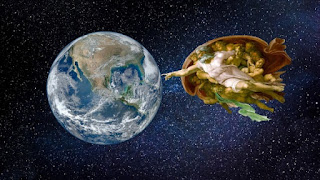No, the Bible does not explicitly state that the world was created on October 23, 4004 BC, nor does it give a number of years. That date is the result of calculations by Archbishop James Ussher, and many people believed it until secularists began to force millions of years into Scripture and call it mythology or allegory.
What Ussher and others have done was to calculate the biblical chronogenealogies. This is not just a listing of "the begats" and making assumptions, since the writers were very precise. If you study on it, fairy tales, mythology, tall tales, or whatever are vague; the Bible has detailed accounts, times, places, and so on.
 |
| God created the world, Pixabay / Alfons Schüler |
Many people write in and ask, “How do we know that the earth is 6,000 years old from the Bible?” Given that the chronogenealogies—genealogies where the age of the father at the time of the son’s birth is given in an unbroken chain—end shortly after Noah, how do we get from ~1600 AM (anno mundi = ‘year of the world’) to today, which we would argue is about 6000 AM?
You can read the rest at "How does the Bible teach 6,000 years?"
